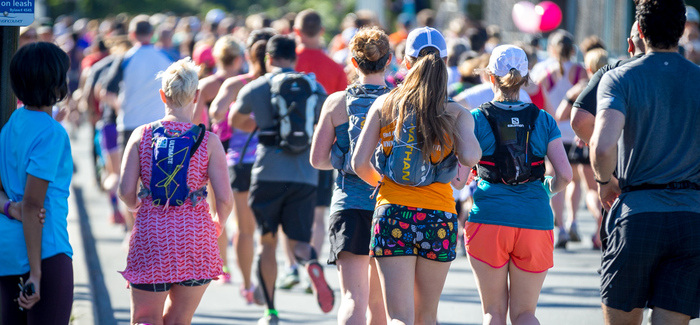
Road to Seek the Peak
Week 5: David Ridgeway of City Sports & Physiotherapy
Posted by Chelsea Carswell May 10, 2016
Each week we’ll be featuring posts from special guests designed to help get you ready for the big day. From nutrition and training tips, to motivational stories – each post will have valuable info to support your journey, all the way to the Peak!
Hello all! At last Wednesday's Seek the Peak training session, I gave a brief talk on hydration and the importance of a proper warm-up before training. Here is a little recap for those who missed it.
Hydration:
It is best to hydrate consistently throughout the day rather than packing/consuming a lot of water only during your training. This means consuming about 2-3L of water per day. A standard water bottle is 500-750ml, so keep one nearby, and fill and drink it 4x per day. It is a challenge, but having your water bottle ready is step #1.
Warm-up Exercises:
1. Leg swings (forward and back):
- 2 sets of 30, each leg. Start low and work your way to higher kicks as you approach rep 30
- Keep your stomach muscles engaged and do not let your lower back arch (extend)
- The movement should feel like it is coming from your hips not your back
2. Reverse lunge with knee drive:
- 3 sets of 10
- Drive your knee up to hip height
- This challenges your balance and works through range of motion for you ankles, knees and hips
3. Squats 3 ways:
- 10 reps with feet hip width apart
- 10 reps with feet narrow
- 10 reps with feet wide and toes turned out slightly
- SQUEEZE YOUR GLUTES!
Nutrition:
Equally important to hydration is nutrition. The purpose of this post is to give you some ideas of what snacks to consume before and after training that will optimize your hard work out on the road/trails.
Before:
Low Glycemic Index (GI) foods like whole grain products, beans, oatmeal, and chickpeas are best consumed at least 30 minutes before training. Everyone will be different in terms of how close to training they can eat, but a good rule of thumb is to eat at least 30 minutes before training. Low GI foods are broken down in our body slower and provide a nice consistent blood sugar level while you train. A training session when your blood sugar levels are low is not only dangerous, but it will not bring the same benefit as having a small snack before. Check your food labels to see if it discloses the item's GI index. A number closer to 100 = HIGH (ie. Glucose is 100). Rule of thumb is high fiber, protein, or grain content = low GI.
After:
High GI foods such as apples, grapes (most fruit) and snack bars that are high in sugar are best saved as a post work out treat. High GI foods supply a quick spike in blood sugar levels. This is best to happen after a work out as your blood sugars will be depleted and the glucose consumed will be converted to glycogen and stored for your next training session. It is also important to consume protein after, as our muscles require the amino acids to repair and recover. For any of you milk drinkers out there, chocolate milk is a great option and personal favorite. The optimal window for consumption is 15 minutes to 1.5 hours after training. To put things in perspective, 15 minutes would be what elite athletes shoot for but anything within that window will suit the everyday athlete.
Real World:
I don’t want anyone panicking about having perfectly planned meals for their week and training sessions. This information is here to serve as a reminder that today’s recovery will benefit tomorrow’s training. It can be as simple as having some nuts or an oatmeal bar for before training, and an apple after training. This allows you to make it home or back to the office for a meal with some protein (chicken, chickpeas/hummus, beans, lentils, yogurt) to maximize the positive effects of your training session.
Thanks for reading!
David Ridgewell MPT, BSc Kin, CAFCI
Registered Physiotherapist
City Sports and Physiotherapy
